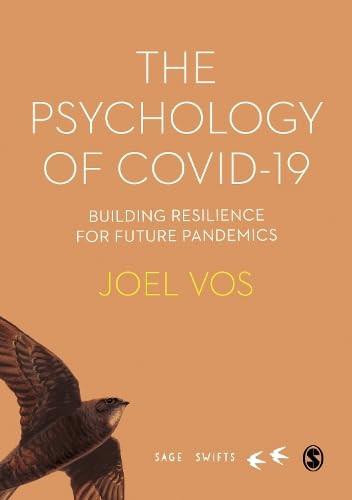Irza Fidah's Key Ideas from The Psychology of Covid-19: Building Resilience for Future Pandemics
by Joel Vos
Ideas, facts & insights covering these topics:
19 ideas
·2.45K reads
11
3
Explore the World's Best Ideas
Join today and uncover 100+ curated journeys from 50+ topics. Unlock access to our mobile app with extensive features.
The World Risk Society #1
The psychological impact is often more extensive than the direct somatic effects of pandemics.
22
300 reads
The World Risk Society #2
More people may die from the lockdown than from Covid-19, due to psychological stress, lack of physical exercise and social connections, and postponing of non-Covid-19-related medical consultations and surgeries.
21
225 reads
Natural Risks: Uncertain Science #1
We live under the dictatorship of urgency. Pandemic science is based on statistical risk calculations, not on absolute facts or the results from nationwide experiments.
22
175 reads
Natural Risks: Uncertain Science #2
In sum, PCR tests have been critisiced for the large number of false-positives and false-negatives, and a lack of a gold standard.
21
169 reads
Natural Risks: Uncertain Science #3
Researchers on the psychology of conspiracy theories often use the rule-of-thumb that the more people are involved in a conspiracy, the less likely the conspiracy is to be true, because it is more likely that there will be some whistle-blowers amongst a large group of conspiracists.
21
141 reads
Natural Risks: Uncertain Science #4
Prime Minister Johnson referred to a piece of advice from the Behavioural Insight Teams (BIT) that a lockdown early during the pandemic could lead to ‘behavioural fatigue’: if restrictions come into force too early, people could become increasingly uncooperative and less vigilant, before the peak of the pandemic had even started.
20
152 reads
Social Risks: Uncertain Politicians
Similarly, the physical and psychological side effects of the lockdowns – including suicides and deaths from postponed non-Covid-19-related medical consultations and surgeries – seem to be widely accepted without much public outcry – as the bigger picture is saving Life in General.
21
124 reads
Media Risks: Uncertain Journalists #1
Under heightened stress and uncertain situations beyond one’s control, people seem to lose their ability to weigh accurately and judge information.
22
114 reads
Media Risks: Uncertain Journalists #2
Exposure → anxiety + perception of large risk → more exposure -> more anxiety and perception of larger risk -> etc.
22
116 reads
Media Risks: Uncertain Journalists #3
Several studies indicate that the more time people spent on following the news or social media, the larger they perceive the risks to be and the more mental health problems they report. Thus, it seems the amount of exposure – or addiction – that predicts the impact. Furthermore, other studies indicate that the media have a larger influence when people trust them, whereas individuals critical of the media will be less influenced in their perception and their mental health.
22
97 reads
Risk-Perception: Uncertain Interpretations
We cannot control or manage these unknowns; the best we can do is to ‘cope with the unknown’.
22
102 reads
Mental Health Risks: Uncertain Minds
During collective disasters and grief, people can benefit from reconstructing their perception of the world and meaning in life.
21
100 reads
Existential Risks: Uncertain Life #1
In everyday daily life, we rarely reflect on our body and out health risks. We simply follow our habits.
23
93 reads
Existential Risks: Uncertain Life #2
As Merleau-Ponty (1982) wrote: 'We understand the world from our phenomenological experience of our body.'
21
100 reads
Existential Risks: Uncertain Life #3
In contrast with this lived experience of our body, health risks are abstract, anonymous, and dehumanised
22
92 reads
Existential Risks: Uncertain Life #4
Being confronted with the fact that our body can fail and die, which can provoke a feeling of threat and anxiety.
21
87 reads
Existential Risks: Uncertain Life #5
Some individuals may prefer the certainty of illness over the existential uncertainty.
21
89 reads
Existential Risks: Uncertain Life #6
A concept related to worldviews is 'meaning of life'. People often speak about the importance of meaning when they are confronted with life's boundaries, such as the threat of chronic or life-threatening disease.
21
88 reads
The World Resilience Society
We live in a World Risk Society: we are continuously reminded of risks around us, from the financial risks of our loans and mortgages to climate change.
21
94 reads
IDEAS CURATED BY
interested in psychology, philosophy, and literary📚 welcome to Irza's place of safe haven~! hope you enjoy my curations and stashes^^.
CURATOR'S NOTE
The Psychology of Covid-19 explores how the coronavirus pandemic is giving rise to a new order in our personal lives, societies, and politics. Rooted in systematic research on Covid-19 and previous pandemics, this book describes how people perceive and respond to Covid-19, and how it has impacted a broad range of domains, including lifestyle, politics, science, mental health, media, and meaning in life. Building on this, the book then sets out how we can improve our psychological and social resilience, to safeguard ourselves against the psychological effects of future pandemics.
“
Discover Key Ideas from Books on Similar Topics
3 ideas
Misbelief
Dan Ariely
7 ideas
Prompt Engineering Using ChatGPT
Mehrzad Tabatabaian
10 ideas
Boundless Leadership
Joe Loizzo, Elazar Aslan
Read & Learn
20x Faster
without
deepstash
with
deepstash
with
deepstash
Personalized microlearning
—
100+ Learning Journeys
—
Access to 200,000+ ideas
—
Access to the mobile app
—
Unlimited idea saving
—
—
Unlimited history
—
—
Unlimited listening to ideas
—
—
Downloading & offline access
—
—
Supercharge your mind with one idea per day
Enter your email and spend 1 minute every day to learn something new.
I agree to receive email updates
